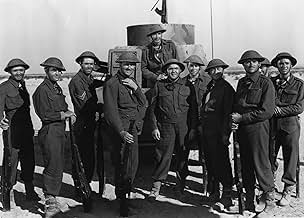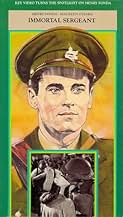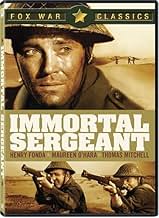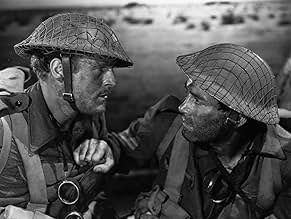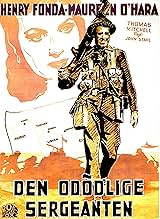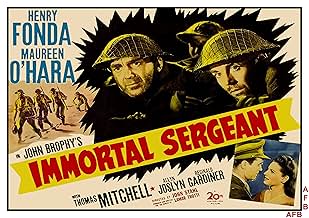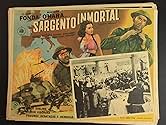IMDb RATING
6.6/10
1.1K
YOUR RATING
During a WW2 patrol in the North-African desert, a Canadian corporal reminisces about his sweetheart and must lead his platoon when the sergeant gets wounded.During a WW2 patrol in the North-African desert, a Canadian corporal reminisces about his sweetheart and must lead his platoon when the sergeant gets wounded.During a WW2 patrol in the North-African desert, a Canadian corporal reminisces about his sweetheart and must lead his platoon when the sergeant gets wounded.
- Awards
- 3 wins total
John Banner
- Officer
- (uncredited)
Wilson Benge
- Waiter
- (uncredited)
Lane Bradford
- Returning Soldier
- (uncredited)
James Carlisle
- Party Guest
- (uncredited)
Gordon B. Clarke
- Soldier
- (uncredited)
Ruth Clifford
- Nightclub Patron
- (uncredited)
James Craven
- NCO
- (uncredited)
Oliver Cross
- Nightclub Patron
- (uncredited)
Jack Deery
- Party Guest
- (uncredited)
- Director
- Writers
- All cast & crew
- Production, box office & more at IMDbPro
Featured reviews
1943's The Immortal Sergeant is a tedious and overly melodramatic bit of dullness that makes you glad we won WWII. But how?
I never got a chance to suspend my disbelief with this movie. Every moment I saw characters running hither and yon, pursuing Nazis or being strafed, I reacted with a dull, throbbing irritation. The movie is so drab that whatever does get done right gets lost in the wrong.
Henry Fonda, the young Canadian soldier in the Royal Army, is such a wussburger, he's willing to let Maureen O'Hara go to a teddibly uppa-crust war correspondent (Allyn Joslyn) instead of popping him in the nose. He whines to his sergeant (the immortal one--Thomas Sullivan) that he can't have a rank of responsibility. When he takes over the patrol, he has to quell a mutiny, slaughter a bunch of Italians and Germans, and make it back to base, all the while being crippled by some of the most boring flashbacks I've ever seen.
By the time our hero gets a medal pinned on his hospital robe (yeah, he makes it), he has turned in to a nasty, kill-em-all-and-let-God- sort-them-out candidate for a commission. He tells the teddible war correspondent that if he doesn't get a letter to O'Hara telling her he wants to marry her, he'll murder the journalist friend.
Sheesh, not "I'll smack ya in the kisser" or "I'll dance on your head, but "I'll murder you."
So much for Mr. Nice Wussburger. I think I liked him better.
The Immortal Sergeant didn't teach that to Corporal Jackass.
I never got a chance to suspend my disbelief with this movie. Every moment I saw characters running hither and yon, pursuing Nazis or being strafed, I reacted with a dull, throbbing irritation. The movie is so drab that whatever does get done right gets lost in the wrong.
Henry Fonda, the young Canadian soldier in the Royal Army, is such a wussburger, he's willing to let Maureen O'Hara go to a teddibly uppa-crust war correspondent (Allyn Joslyn) instead of popping him in the nose. He whines to his sergeant (the immortal one--Thomas Sullivan) that he can't have a rank of responsibility. When he takes over the patrol, he has to quell a mutiny, slaughter a bunch of Italians and Germans, and make it back to base, all the while being crippled by some of the most boring flashbacks I've ever seen.
By the time our hero gets a medal pinned on his hospital robe (yeah, he makes it), he has turned in to a nasty, kill-em-all-and-let-God- sort-them-out candidate for a commission. He tells the teddible war correspondent that if he doesn't get a letter to O'Hara telling her he wants to marry her, he'll murder the journalist friend.
Sheesh, not "I'll smack ya in the kisser" or "I'll dance on your head, but "I'll murder you."
So much for Mr. Nice Wussburger. I think I liked him better.
The Immortal Sergeant didn't teach that to Corporal Jackass.
Henry Fonda looks just like he appeared in 1940's "The Grapes of Wrath."
This is quite a good film detailing several soldiers caught in Africa during World War 11 and how they eventually overcome their perils.
Thomas Mitchell, as the old-time sergeant is a standout here. There is able support by Allyn Joslyn, Reginald Gardiner and others.
Maureen O'Hara is used mainly in flashbacks here as Fonda thinks back of his past while trying to lead his men to freedom.
The ending seems rushed up as Fonda wakes up in the hospital and is told how they got out of their predicament.
This is quite a good film detailing several soldiers caught in Africa during World War 11 and how they eventually overcome their perils.
Thomas Mitchell, as the old-time sergeant is a standout here. There is able support by Allyn Joslyn, Reginald Gardiner and others.
Maureen O'Hara is used mainly in flashbacks here as Fonda thinks back of his past while trying to lead his men to freedom.
The ending seems rushed up as Fonda wakes up in the hospital and is told how they got out of their predicament.
In his memoirs Henry Fonda hated this film above all others that he did in his career. That's taking in quite a bit of territory because Fonda did some dreadful stuff in the seventies like Tentaccoli with a giant octopus. A lot of this was done for the money and Fonda with five wives certainly had much expenses in alimony.
But Immortal Sergeant held a place dear in his heart because of the head of 20th Century Fox, Darryl F. Zanuck. Back in 1940 in order to get the part of Tom Joad, Fonda made a faustian deal with Zanuck signing his only studio contract. The studio cast him in what he considered junk. The good films he made in that four year stretch were on loan out, to Paramount for The Lady Eve, to Warner Brothers for The Male Animal, to RKO for The Big Street. He was not fond of what Fox cast him in for the most part because he got what was left after Tyrone Power and Don Ameche rejected it.
Anyway come 1943 Fonda had two objectives, to make The Oxbow Incident because he knew that would be a classic and to enlist in World War II as pal Jimmy Stewart did. He prevailed on Zanuck to do The Oxbow Incident and it was a cheaply made western, classic though it was because it was shot completely on the sound stage.
Then Zanuck cajoled, begged, and pleaded with him to make this one more film which he said was a great propaganda piece one that would tear the hearts of the movie going public and rally the homefront and be an inspiration to the fighting troops.
When Immortal Sergeant proved somewhat less than that, Fonda felt hoodwinked and gritted his teeth and finished the film. He tried in fact to enlist to get out of it and Zanuck had so much pull in Washington, DC, Fonda kept getting his enlistment postponed.
It was one angry Henry Fonda who finished The Immortal Sergeant and then went to war. His experience with this film made him bound and determined to get out of his contract one way or another. Ultimately he left Hollywood in 1948 when he got a great Broadway role in Mister Roberts. Fonda didn't return to Hollywood until 1955 and then to make the screen version of Mister Roberts.
But that's getting away from Immortal Sergeant. Without Henry Fonda's rather colored viewpoint of the situation let me say it's not the worst World War II flag waver the studios put out. As is usual Henry Fonda is a Canadian to explain his non-British speech who has enlisted in the British army and is serving in North Africa. He's a young man with a lot of angst and when his patrol's sergeant is killed, Fonda has to summon something from within to bring the men back to their lines.
Thomas Mitchell is the sergeant and Maureen O'Hara is Fonda's girl back home and both do a creditable job.
For the rest of his life Fonda would foam at the mention of Immortal Sergeant. Being the professional he was, he did a good job in the film.
But Immortal Sergeant hardly belongs in the same company as The Oxbow Incident and Mister Roberts in the works of Henry Fonda.
But Immortal Sergeant held a place dear in his heart because of the head of 20th Century Fox, Darryl F. Zanuck. Back in 1940 in order to get the part of Tom Joad, Fonda made a faustian deal with Zanuck signing his only studio contract. The studio cast him in what he considered junk. The good films he made in that four year stretch were on loan out, to Paramount for The Lady Eve, to Warner Brothers for The Male Animal, to RKO for The Big Street. He was not fond of what Fox cast him in for the most part because he got what was left after Tyrone Power and Don Ameche rejected it.
Anyway come 1943 Fonda had two objectives, to make The Oxbow Incident because he knew that would be a classic and to enlist in World War II as pal Jimmy Stewart did. He prevailed on Zanuck to do The Oxbow Incident and it was a cheaply made western, classic though it was because it was shot completely on the sound stage.
Then Zanuck cajoled, begged, and pleaded with him to make this one more film which he said was a great propaganda piece one that would tear the hearts of the movie going public and rally the homefront and be an inspiration to the fighting troops.
When Immortal Sergeant proved somewhat less than that, Fonda felt hoodwinked and gritted his teeth and finished the film. He tried in fact to enlist to get out of it and Zanuck had so much pull in Washington, DC, Fonda kept getting his enlistment postponed.
It was one angry Henry Fonda who finished The Immortal Sergeant and then went to war. His experience with this film made him bound and determined to get out of his contract one way or another. Ultimately he left Hollywood in 1948 when he got a great Broadway role in Mister Roberts. Fonda didn't return to Hollywood until 1955 and then to make the screen version of Mister Roberts.
But that's getting away from Immortal Sergeant. Without Henry Fonda's rather colored viewpoint of the situation let me say it's not the worst World War II flag waver the studios put out. As is usual Henry Fonda is a Canadian to explain his non-British speech who has enlisted in the British army and is serving in North Africa. He's a young man with a lot of angst and when his patrol's sergeant is killed, Fonda has to summon something from within to bring the men back to their lines.
Thomas Mitchell is the sergeant and Maureen O'Hara is Fonda's girl back home and both do a creditable job.
For the rest of his life Fonda would foam at the mention of Immortal Sergeant. Being the professional he was, he did a good job in the film.
But Immortal Sergeant hardly belongs in the same company as The Oxbow Incident and Mister Roberts in the works of Henry Fonda.
Low-budget film with the sole purpose of serving as war propaganda for the entire Allied side. The protagonist, an antihero due to his wartime experience, unwittingly and subsequently consciously transforms into a hero. What a more fantastical transformation, when in reality, war often produces exactly the opposite. But well, any ammunition is necessary in the war effort, and what better ammunition than young volunteers, deceived by unfiltered and unscrupulous propaganda.
Well, but this veiled or blatant propaganda seems inevitable for any war-themed film production; you know it, and you have to deal with it.
Cinematographically speaking, the film barely passes with so little money; there are no visual resources for more than a desert as the main setting and the night that conceals everything, flaws included. Narratively, everything is focused on the film's main mission, so no one in the production has made an effort to offer more. Even Fonda, who accepted this supporting role, later regretted it in his biography.
But well, the only thing that saves it is that classic cinema has its charm, a mixture of black and white drama, close-ups that few actors today can endure, and that aura of times past, which in the collective imagination is mistakenly always considered better. Another interesting aspect not to forget is that the film is contemporary to the events narrated, and for war genre enthusiasts, it's always a pleasure to be able to enjoy them, even though it's impossible not to think that while some were giving their lives, fighting in battles or under the oppressive yoke of the occupying enemy, others could indulge in the magical world of the seventh art.
Well, but this veiled or blatant propaganda seems inevitable for any war-themed film production; you know it, and you have to deal with it.
Cinematographically speaking, the film barely passes with so little money; there are no visual resources for more than a desert as the main setting and the night that conceals everything, flaws included. Narratively, everything is focused on the film's main mission, so no one in the production has made an effort to offer more. Even Fonda, who accepted this supporting role, later regretted it in his biography.
But well, the only thing that saves it is that classic cinema has its charm, a mixture of black and white drama, close-ups that few actors today can endure, and that aura of times past, which in the collective imagination is mistakenly always considered better. Another interesting aspect not to forget is that the film is contemporary to the events narrated, and for war genre enthusiasts, it's always a pleasure to be able to enjoy them, even though it's impossible not to think that while some were giving their lives, fighting in battles or under the oppressive yoke of the occupying enemy, others could indulge in the magical world of the seventh art.
"Immortal Sergeant" was apparently not one of Henry Fonda's favorite film roles. I am not sure why "The Big Street" wasn't his least favorite (it was god-awful, believe me) but he disliked it. And, I might add, my wife wasn't super-fond a this film as we watched it. However, I really thought it was pretty good...though I do wonder if the main character played by Fonda might have been schizophrenic--that's because throughout the film he keeps hearing the voice of his sergeant--even though the guy is dead!
The film is a WWII propaganda film. Because of this, it's main thrust is NOT realism but to bolster folks' support of the war effort. I cut the film a bit of slack, as it was 1943 and keeping up morale was a major concern. What I didn't like was the casting of Fonda, as he was supposed to be a Brit--and seemed about as British as John Wayne or Hattie McDaniel! In this sense, I could see why he didn't like playing this role--but the plot is pretty good and more than makes up for this.
The sergeant in the title is played by Thomas Mitchell--and he's very good in this role. This guy is a career soldier and seems indestructible to his men--and he is adored by them. However, although he seems to have all the answers, his corporal (Fonda) seems quite different--unsure of himself and not at all the soldier Mitchell is. But, when the sergeant is killed and Fonda is left in charge of a small group of men in the North African desert, he's given a chance to show his mettle.
In many ways, this film is a lot like the film "Sahara"--though "Sahara" is a much more enjoyable (and less realistic) film. Both are set in the same locale and are about a small group of soldiers overcoming greater numbers of enemy soldiers. But the casting and script just weren't quite as good here--though the film STILL is enjoyable and did what the studio wanted it to do. I also appreciate how the men in this film were NOT indestructible--many died even though you KNEW how it all had to end. Not brilliant but quite entertaining.
The film is a WWII propaganda film. Because of this, it's main thrust is NOT realism but to bolster folks' support of the war effort. I cut the film a bit of slack, as it was 1943 and keeping up morale was a major concern. What I didn't like was the casting of Fonda, as he was supposed to be a Brit--and seemed about as British as John Wayne or Hattie McDaniel! In this sense, I could see why he didn't like playing this role--but the plot is pretty good and more than makes up for this.
The sergeant in the title is played by Thomas Mitchell--and he's very good in this role. This guy is a career soldier and seems indestructible to his men--and he is adored by them. However, although he seems to have all the answers, his corporal (Fonda) seems quite different--unsure of himself and not at all the soldier Mitchell is. But, when the sergeant is killed and Fonda is left in charge of a small group of men in the North African desert, he's given a chance to show his mettle.
In many ways, this film is a lot like the film "Sahara"--though "Sahara" is a much more enjoyable (and less realistic) film. Both are set in the same locale and are about a small group of soldiers overcoming greater numbers of enemy soldiers. But the casting and script just weren't quite as good here--though the film STILL is enjoyable and did what the studio wanted it to do. I also appreciate how the men in this film were NOT indestructible--many died even though you KNEW how it all had to end. Not brilliant but quite entertaining.
Did you know
- TriviaAccording to TCM's Robert Osborne, this was the last film Henry Fonda worked on before enlisting in the U.S. Navy during World War II.
- GoofsWhen the survivors come across the vehicle tracks after the attack on the Italian armoured car, multiple shadows of the soldiers can be seen, indicating multiple light sources.
- Quotes
Sgt. Kelly: Drinking water is the worst thing in the world for a wound like mine.
[in the groin]
- ConnectionsEdited into La guerre, la musique, Hollywood et nous... (1976)
- SoundtracksThe Campbells Are Coming
(uncredited)
Traditional
Played on the bagpipes at the beginning
- How long is Immortal Sergeant?Powered by Alexa
Details
- Runtime
- 1h 31m(91 min)
- Color
- Aspect ratio
- 1.37 : 1
Contribute to this page
Suggest an edit or add missing content


